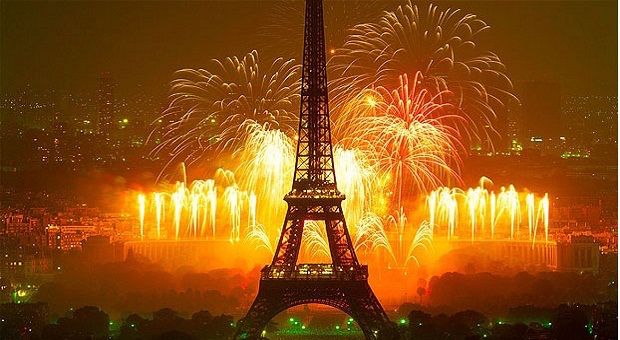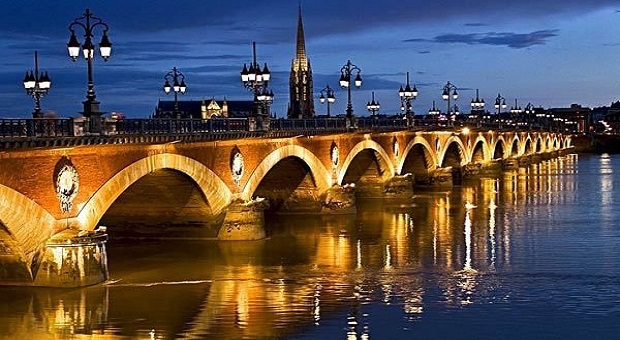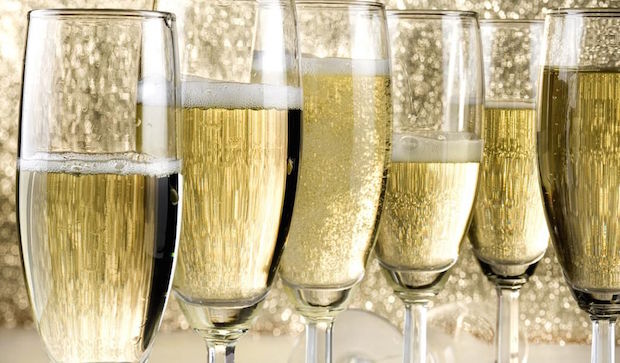As New Year's Eve is fast approaching we thought we should take a look at how it is celebrated in France and see if we can point out some differences to where you live?
December 31st - New Year's Eve is called la Saint-Sylvestre and is celebrated with a feast by most people, called le Réveillon de Saint-Sylvestre unsurprisingly (31 December is his saint's day). The feast includes special items like champagne and perhaps controvertially foie gras, the accompanying party can range from an intimate dinner with friends to lavish public events most often called une soirée dansante (a dance ball).
Kissing under the mistletoe
At midnight, everyone kisses under the mistletoe and offers their best wishes for the new year. Kissing under the mistletoe? I hear you ask? well, interestingly, kissing under the mistletoe is a New Year's Eve / Day custom in France rather than a Christmas custom as in the UK and other countries. Note that the kissing may be on the lips or on the cheek, depending on the relationship between the two people so if you are not sure then start with the cheek and the French person will take the lead from there!

The end of the holiday season is Epiphany, on 6 January, although I have seen Christmas decoratyion still 'up' and illuminated at night almost as long as up to Easter!, Epiphany in France includes a traditional cake called la galette des rois but if you bite into one becareful as you may break a tooth on the cadeaux often found inside these cakes, but don't worry it means good luck!
Saint Sylvestre was Pope from 314 to 335 A.D., during the time of the rule of Constantine the Great. Although there is no actual link between Saint Sylvestre and the new year, it just that 31 December is his feast or Saint's day. La Saint-Sylvestre is feminine because it's short for la fête de Saint-Sylvestre.

New Year’s Traditions in France
Celebrating the New Year is a little different in France than it is in the UK or the US.
Cards.
I hope you were not offended if you got less Christmas cards this year, if it was your first year in france? the French people don’t send Christmas cards! they send New Year’s greeting cards instead, so they is hope yet. So if you are sending cards to people in France, you don’t have to rush, just catch the post for the week inbetween Chritmas and New Year.
People in France continue to wish each other la bonne année throughout the month of January! No interaction is complete in France in the month of January without starting your conversation with Meilleurs voeux (Best wishes).
Etrennes.
It is also common practice in France to give gifts of money to people who serve you on a regular basis, any tips to Cle France staff will be accepted merrily (LOL). The local firemen are the most proactive in my experience and they will knock on your door with the 'excuse' of selling you a calendar, even the garbage man in towns and cities (les éboueurs) may knock on your door. It’s the equivalent of their 13th month, and the French tend to be quite generous so if you want a good service you may have to dig deep.
Le Réveillon.
As you know by now the Christmas Eve dinner is known as le réveillon and so is New Year’s Eve dinner! so easy to remeber even after a galss or two! To distinguish the two, the celebration on the 31st is called la Saint-Sylvestre, or le réveillon de la Saint-Sylvestre. The festive meal is similar to the one shared at Christmas – goose or turkey, oysters, foie gras, Boudin blanc – with the addition of copious amounts of champagne, bien sûr, and dancing and partying long into the night is normal and to be expected.
Metros and public transportation in the large cities are free for the evening to discourage drivers from taking to the road in their cars after indulging which is a very effective policy.
Midnight.
At the stroke of midnight on New Year’s Eve, expect to receive kisses on both cheeks and a hearty bonne année! Fireworks at private parties have been surpressed in the past years due to the dangers, but this is not the case for the local communes who often have a spectacular display and a party for all the villagers.
On New Year’s Day – le jour de l’an.
Parades fill the streets which you can watch in person, if you don’t mind the cold, or on TV from the comfort of your own home, friends house and even in the local sports bar, in fact anywhere where there is a TV it will be tuned to the local 'big town' celebrations!

The most famous New Year parade takes place in Paris every year. Thousands of performers from all over the world take part in the show with wonderful songs, dances and other cultural activities. The parade goes through the many districts and streets of Paris. Generally, it starts on 31st December and passes through Chantilly to reach Trocardero, under the Eiffer Tower on January 1st.
What about New Years Resolutions?
Le Jour de l'An is the day when people share their resolutions among near and dear friends, you may not get such a warm reply if you ask a neighbour what their resolution is, these are really kept between very close family members. Cards and gifts are exchanged on New Years Day, which reflect the mood and the spirit of the celebration.
This is the perfect time for family members and friends to be with each other. They dine together, have fun and form great memories. I have seen that the chef in the family will prepare heart or log shaped desserts, usually made from ice cream (don't worry these are also widely available in supermarkets across France).
People are highly excited and welcome the fresh year in whole-heartedly in France so all you need to do is join in, not that different to the UK or the US afterall, just jump in and have a good time seems to be the order of the day.
Bonne Année ! from Sharon, David, Simon, Alex and all the team at Cle France.

Blog submitted by: David at The French Property Network - Cle France.